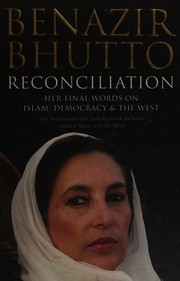Check nearby libraries
Buy this book

Writing a few months prior to her assassination, Bhutto explores the complicated history between the Middle East and the West. She traces the roots of international terrorism across the world, including American support for Pakistani general Zia-ul-Haq, who destroyed political parties, eliminated an independent judiciary, marginalized NGOs, suspended the protection of human rights, and aligned Pakistani intelligence agencies with the most radical elements of the Afghan mujahideen. She speaks out not just to the West, but to the Muslims across the globe who are at a crossroads between the past and the future, between education and ignorance, between peace and terrorism, and between dictatorship and democracy. Democracy and Islam are not incompatible, and the clash between Islam and the West is not inevitable.--From publisher description.
Check nearby libraries
Buy this book

Previews available in: English
Subjects
Nonfiction, Politics, Politics and government, Islam and politics, Democracy, Islamic fundamentalism, Relations, Islamic countries, Foreign relations, Islam, International relations, Elections, Pakistan People's Party, Biography, Prime ministers, East and West, Politik och förvaltning, Biografi, Premiärministrar, Islam och politik, New York Times reviewed, World politics, 1989-, Bhutto, benazir, 1953-2007, Pakistan, foreign relations, United states, foreign relations, pakistan, Pakistan, politics and government, Islamic countries, relations, europe, Democracy, religious aspects, Europe, relations, islamic countries, Islamic countries, politics and government| Edition | Availability |
|---|---|
|
1
Reconciliation: Islam, Democracy and the West
2014, Simon & Schuster, Limited
in English
1471138127 9781471138126
|
zzzz
|
|
2
Reconciliation: Islam, Democracy, and the West
Dec 23, 2008, Harper Perennial
paperback
0061567590 9780061567599
|
zzzz
|
| 3 |
aaaa
|
| 4 |
zzzz
|
|
5
Reconciliation: Islam, Democracy, and the West
February 12, 2008, Harper
Hardcover
in English
0061567582 9780061567582
|
eeee
|
Book Details
Table of Contents
Edition Notes
Originally published: London: Simon & Schuster.
Includes bibliographical references.
Classifications
The Physical Object
Edition Identifiers
Work Identifiers
Work Description
Benazir Bhutto returned to Pakistan in October 2007, after eight years of exile, hopeful that she could be a catalyst for change. Upon a tumultuous reception, she survived a suicide-bomb attack that killed nearly two hundred of her countrymen. But she continued to forge ahead, with more courage and conviction than ever, since she knew that time was running out—for the future of her nation, and for her life.In Reconciliation, Bhutto recounts in gripping detail her final months in Pakistan and offers a bold new agenda for how to stem the tide of Islamic radicalism and to rediscover the values of tolerance and justice that lie at the heart of her religion. With extremist Islam on the rise throughout the world, the peaceful, pluralistic message of Islam has been exploited and manipulated by fanatics. Bhutto persuasively argues that America and Britain are fueling this turn toward radicalization by supporting groups that serve only short-term interests. She believed that by enabling dictators, the West was actually contributing to the frustration and extremism that lead to terrorism. With her experience governing Pakistan and living and studying in the West, Benazir Bhutto was versed in the complexities of the conflict from both sides. She was a renaissance woman who offered a way out.In this riveting and deeply insightful book, Bhutto explores the complicated history between the Middle East and the West. She traces the roots of international terrorism across the world, including American support for Pakistani general Zia-ul-Haq, who destroyed political parties, eliminated an independent judiciary, marginalized NGOs, suspended the protection of human rights, and aligned Pakistani intelligence agencies with the most radical elements of the Afghan mujahideen. She speaks out not just to the West, but to the Muslims across the globe who are at a crossroads between the past and the future, between education and ignorance, between peace and terrorism, and between dictatorship and democracy. Democracy and Islam are not incompatible, and the clash between Islam and the West is not inevitable. Bhutto presents an image of modern Islam that defies the negative caricatures often seen in the West. After reading this book, it will become even clearer what the world has lost by her assassination.
Links outside Open Library
Community Reviews (0)
| December 26, 2021 | Edited by ImportBot | import existing book |
| December 26, 2021 | Edited by ImportBot | import existing book |
| August 6, 2021 | Edited by New York Times Bestsellers Bot | Add NYT review links |
| July 27, 2020 | Edited by MARC Bot | import existing book |
| December 9, 2009 | Created by WorkBot | add works page |













